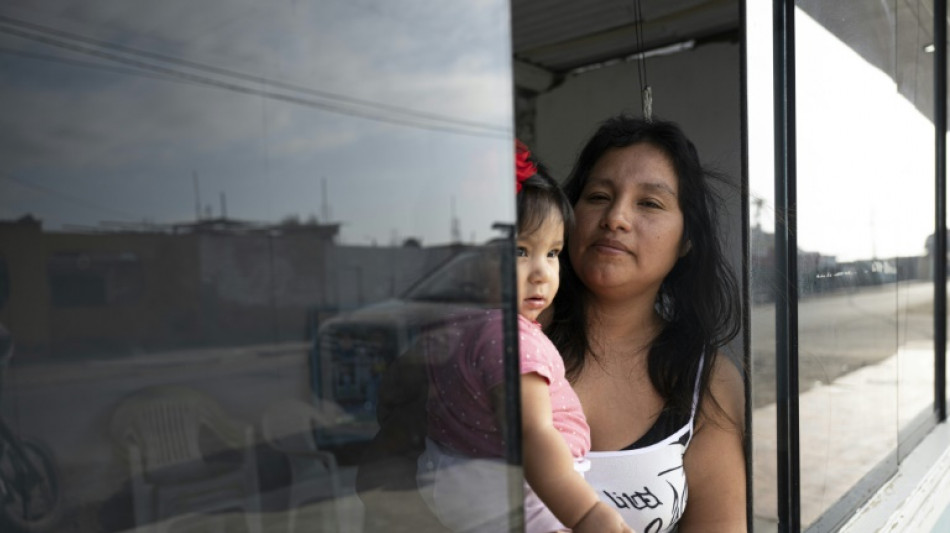
-
 Nigeria signals more strikes likely in 'joint' US operations
Nigeria signals more strikes likely in 'joint' US operations
-
Malaysia's former PM Najib convicted in 1MDB graft trial

-
 Elusive wild cat feared extinct rediscovered in Thailand
Elusive wild cat feared extinct rediscovered in Thailand
-
Japan govt approves record budget, including for defence

-
 Seoul to ease access to North Korean newspaper
Seoul to ease access to North Korean newspaper
-
History-maker Tongue wants more of the same from England attack

-
 Australia lead England by 46 after 20 wickets fall on crazy day at MCG
Australia lead England by 46 after 20 wickets fall on crazy day at MCG
-
Asia markets edge up as precious metals surge

-
 Twenty wickets fall on day one as Australia gain edge in 4th Ashes Test
Twenty wickets fall on day one as Australia gain edge in 4th Ashes Test
-
'No winner': Kosovo snap poll unlikely to end damaging deadlock

-
 Culture being strangled by Kosovo's political crisis
Culture being strangled by Kosovo's political crisis
-
Main contenders in Kosovo's snap election

-
 Australia all out for 152 as England take charge of 4th Ashes Test
Australia all out for 152 as England take charge of 4th Ashes Test
-
Boys recount 'torment' at hands of armed rebels in DR Congo

-
 Inside Chernobyl, Ukraine scrambles to repair radiation shield
Inside Chernobyl, Ukraine scrambles to repair radiation shield
-
Bondi victims honoured as Sydney-Hobart race sets sail

-
 North Korea's Kim orders factories to make more missiles in 2026
North Korea's Kim orders factories to make more missiles in 2026
-
Palladino's Atalanta on the up as Serie A leaders Inter visit

-
 Hooked on the claw: how crane games conquered Japan's arcades
Hooked on the claw: how crane games conquered Japan's arcades
-
Shanghai's elderly waltz back to the past at lunchtime dance halls

-
 Japan govt approves record 122 trillion yen budget
Japan govt approves record 122 trillion yen budget
-
US launches Christmas Day strikes on IS targets in Nigeria

-
 Australia reeling on 72-4 at lunch as England strike in 4th Ashes Test
Australia reeling on 72-4 at lunch as England strike in 4th Ashes Test
-
Too hot to handle? Searing heat looming over 2026 World Cup

-
 Packers clinch NFL playoff spot as Lions lose to Vikings
Packers clinch NFL playoff spot as Lions lose to Vikings
-
Guinea's presidential candidates hold final rallies before Sunday's vote

-
 A Christmas Message to the DEA's Diversion Anti Marijuana Cabal
A Christmas Message to the DEA's Diversion Anti Marijuana Cabal
-
QAT Community Sets QuantumTrade 5.0 for Public Beta Testing in March 2026

-
 BondwithPet Expands B2B Offering with Custom Pet Memorial Product
BondwithPet Expands B2B Offering with Custom Pet Memorial Product
-
Best Crypto IRA Companies (Rankings Released)

-
 Eon Prime Intelligent Alliance Office Unveils New Brand Identity and Completes Website Upgrade
Eon Prime Intelligent Alliance Office Unveils New Brand Identity and Completes Website Upgrade
-
Villa face Chelsea test as Premier League title race heats up

-
 Spurs extend domination of NBA-best Thunder
Spurs extend domination of NBA-best Thunder
-
Malaysia's Najib to face verdict in mega 1MDB graft trial
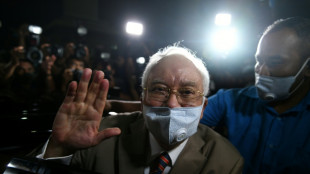
-
 King Charles calls for 'reconciliation' in Christmas speech
King Charles calls for 'reconciliation' in Christmas speech
-
Brazil's jailed ex-president Bolsonaro undergoes 'successful' surgery

-
 UK tech campaigner sues Trump administration over US sanctions
UK tech campaigner sues Trump administration over US sanctions
-
New Anglican leader says immigration debate dividing UK

-
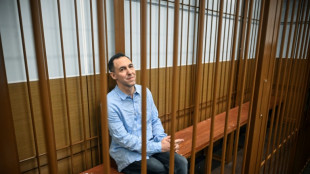 Russia says made 'proposal' to France over jailed researcher
Russia says made 'proposal' to France over jailed researcher
-
Bangladesh PM hopeful Rahman returns from exile ahead of polls

-
 Police suspect suicide bomber behind Nigeria's deadly mosque blast
Police suspect suicide bomber behind Nigeria's deadly mosque blast
-
AFCON organisers allowing fans in for free to fill empty stands: source

-
 Mali coach Saintfiet hits out at European clubs, FIFA over AFCON changes
Mali coach Saintfiet hits out at European clubs, FIFA over AFCON changes
-
Last Christians gather in ruins of Turkey's quake-hit Antakya

-
 Pope Leo condemns 'open wounds' of war in first Christmas homily
Pope Leo condemns 'open wounds' of war in first Christmas homily
-
Mogadishu votes in first local elections in decades under tight security

-
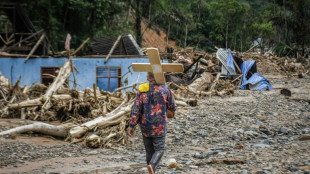 'Starting anew': Indonesians in disaster-struck Sumatra hold Christmas mass
'Starting anew': Indonesians in disaster-struck Sumatra hold Christmas mass
-
Cambodian PM's wife attends funerals of soldiers killed in Thai border clashes

-
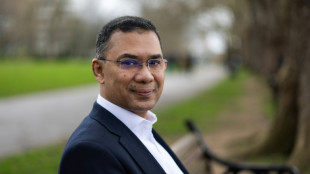 Prime minister hopeful Tarique Rahman arrives in Bangladesh: party
Prime minister hopeful Tarique Rahman arrives in Bangladesh: party
-
Pacific archipelago Palau agrees to take migrants from US
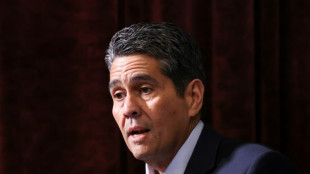

Poisoned by arsenic, and with no way out, Peruvians live in fear
Sayuri Moreno found out while pregnant that her body was contaminated with arsenic, but could not afford doctors' advice to avoid breastfeeding and leave her home in a mining area in northern Peru.
The 37-year-old is one of 120 residents of the Huarmey slums in the Ancash department who were found to have high levels of arsenic in their blood when 140 people were tested last year, according to the Ministry of Health.
Some 3,000 live in this community of wooden houses facing the sea, most of them living off fishing. Behind the settlement rise the hills through which underground pipelines descend, transporting copper and zinc concentrate to Port Huarmey.
Arsenic -- a highly toxic chemical -- can be found naturally alongside copper ore and is released as a byproduct of its processing. Arsenic can also naturally contaminate groundwater.
Peru is the world's second-largest copper producer, however health authorities say they have yet to determine whether the widespread contamination in Huarmey is linked to mining operations.
Most of those affected are women and children. The poisonous chemical can cause skin lesions and cancer, mainly of the lungs, skin and bladder.
"I was scared because I heard that it caused cancer," said Moreno, who was diagnosed during a pre-natal checkup.
- 'Abandoned' -
Her children, Keity, 11, and Iker, 7, also tested positive for high levels of arsenic. Her 11-month-old, Valeria, "was born normal."
The doctor recommended "that we get out of here and that I don't breastfeed my baby," Moreno told AFP.
But like many residents in the region, she and her fisherman husband, Alan Guerrero, were not in a financial position to follow this advice to the letter.
They left Port Huarmey for three months to "detox," but had to return after finding no other work. When they have the money they buy bottled water and formula for the baby.
"We are abandoned in the port, we have no help from anyone, we have a mining industry that is so powerful that we can't do anything," said Guerrero.
Inorganic arsenic is the biggest "chemical contaminant" of drinking water, according to the World Health Organization (WHO), which classifies it as a carcinogen and one of the 10 most dangerous substances for public health.
Jose Saldivar, director of the Huarmey Hospital, said the number of those affected in the community and the levels of arsenic in their bodies was "worrying."
"Every time we do more screening, it is likely that 80 percent" of the cases will come out positive for high levels of arsenic, he said.
Peru's health ministry says the maximum amount of arsenic in the body should be 20 micrograms per liter of urine.
Moreno had 60 micrograms, her eldest daughter, 81 micrograms and her son 70 micrograms.
- 'There is no cure' -
The WHO estimates 140 million people across the globe are exposed to drinking water containing high levels of arsenic.
"There is no cure," said Percy Herrera, a heavy metals expert at the health ministry.
"The best intervention is to identify what the source is and control this source," he added.
When Mireya Minaya was pregnant she was found to have 142 micrograms of arsenic per liter of urine. Her baby, Danna, was born contaminated.
But her three-year-old son, Fabricio, who suffers from anemia, has an even higher concentration: 540 micrograms.
Given the number of cases in Huarmey, the government last year paid for those affected to be treated in Lima, 290 kilometers (180 miles) away.
Minaya was hospitalized for 10 days. Doctors discovered tumors in her ovaries that they told her were probably malignant.
"I didn't want to know anything out of fear and I asked for my voluntary discharge and I came back" to the port, said Minaya, who is a restaurant cook.
"We lived normally... and from one moment to the next we had this nightmare. We don't know if it will ever end."
S.Gregor--AMWN


